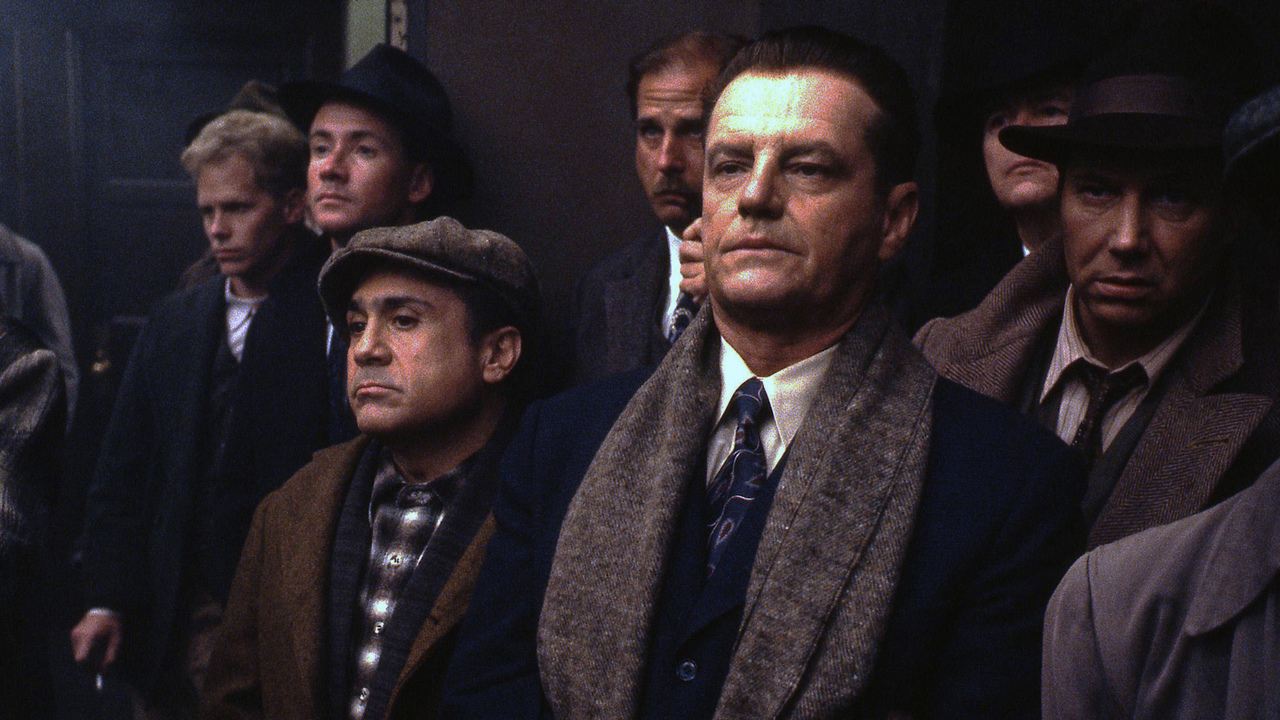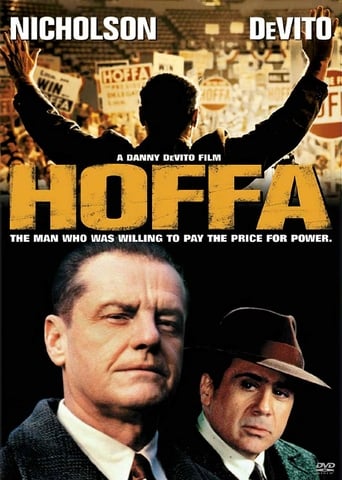Kattiera Nana
I think this is a new genre that they're all sort of working their way through it and haven't got all the kinks worked out yet but it's a genre that works for me.
Salubfoto
It's an amazing and heartbreaking story.
Teddie Blake
The movie turns out to be a little better than the average. Starting from a romantic formula often seen in the cinema, it ends in the most predictable (and somewhat bland) way.
Phillipa
Strong acting helps the film overcome an uncertain premise and create characters that hold our attention absolutely.
Bradley Anbro
I purchased a new copy of this movie from a seller who listed it on one of the internet "for sale" sites; I had checked with my library and also with the video rental store in my area and neither one had the movie available. I had just finished reading the 400+ page book, "Hoffa," by Arthur A. Sloane, Ph.D. Mr. Sloan's book told both the good and the bad about Jimmy Hoffa. I learned by reading the book that Jimmy Hoffa typically worked 16-hour days, six and sometimes seven days a week. I also learned that Jimmy Hoffa neither smoked, drank liquor or ever cheated on his wife. The movie realistically portrayed Jimmy Hoffa as doing his utmost for his Teamster members. The movie also realistically portrayed that the two paramount concerns that Jimmy Hoffa had were for his family and for the rank-and-file members of his union.In my opinion, Jimmy Hoffa's downfall was that he chose to associate himself with organized crime, which in the end cost him his life.
Prismark10
Danny DeVito directs and co-stars with Jack Nicholson in Hoffa. DeVito had high hopes for the film and felt that not only would it be a commercial success but a critical one with awards for cinematography, production design and acting.The film failed at the box office and did not garner the awards expected. The reason because the film is a honourable failure. There is a script by David Mamet and although there are some great production values its not consistent. There is a great scene where Hoffa is talking to some people in a corridor of a building with big windows. Through the windows you can see a courtyard with a market going on with people going about in period costume. In a costume drama, many other people because of the budgetary concerns would had done it just in a walled corridor.However you have scenes where its obviously done in a film set and some scenes are obviously staged such as the hunting scene.The biggest problem is the film does not address the audience outside of the USA who have little or no idea of who Hoffa was. I heard about him as a college student mainly to do with the fact that this a notorious Union leader who is now supporting some bridge under a highway!During the initial scenes when DeVito's character who is a composite of several real life persons first meets Hoffa, I had no idea when the meeting took place. In the 1930s or 40s or the 50s? When Hoffa takes over the Teamster union and wants some people fired, why exactly did he want this? Who were this people that he wanted fired? As we do not know this people do we care? What exactly did Hoffa do wrong for him to be imprisoned? Getting a shady Italian-American to make money for you via some loans is not illegal surely at that time unless it was actual money laundering. Wikipedia tells me that it was fraud, jury tampering and bribery. The film is called Hoffa yet we know so little about him after viewing the film.The film is told in flashbacks as Hoffa waits for a meeting in a parking lot of a diner. Again we are not told of the time period of this setting which should be the mid 1970s as that is when he disappeared although the ending in this film leave little doubt what happens to Hoffa.Its a well constructed film of a man that divides America but DeVito the director needed Mamet to put more detailed in the script so we have a better idea of who Hoffa was.
Lechuguilla
The film's production values are great. Visuals look good with attention to detail in sets, costumes, and makeup. Frame composition and especially lighting create a pleasing, artistic effect. Viewers get a real sense of the American rust belt with its snowy landscape, bleak urban factories, and put-upon laborers during the film's rough and tumble social era spanning four decades, from the 1930s to the 1970s.The problem here is the script concept. Though some viewers, for various reasons, will want to watch a film about Jimmy Hoffa, most potential viewers, I suspect, will opt out. A presumed biography of an American labor leader and his worker rights movement from decades ago will be perceived, rightly so, as a cinematic textbook, dry and uninteresting.The David Mamet screenplay isn't even factual. The chain-smoking Bobby Ciaro (Danny DeVito) is an invention, as is the "Young Kid". The plot begins outside a diner called the "Roadhouse"; in fact, the real-life diner was the "Red Fox Restaurant". Other elements about the film's ending also are fictional. The script leaves out Hoffa's threat to kill JFK, which is part of the historical record. Indeed, the script is semi-biographical and somewhat sanitized. And with the huge amount of dialogue, some of which is political speechifying, the story is at times boring.This is a big-budget, extravagant film with an enormous cast of extras, lots of built sets, some of which are huge. The number of speaking roles also is huge. Big-name stars telegraph to viewers that the film has the blessings of mainstream Hollywood. Acting generally is good. With stiff body movements, squinting eyes, and inner passion, Jack Nicholson gives a fine performance as Hoffa. About midway through, Kevin Anderson nails the role of Robert Kennedy.The enormity of the film effort is impressive; yet it also conveys an impression of cinematic self-importance. But the most basic problem is that the central character has largely faded into history, apart from the mystery of his disappearance. In the twenty-first century, Jimmy Hoffa is so very ... retro.
MisterWhiplash
Hoffa needs a director that has a vision that knocks you on your ass, much like the man at the center of the film himself. Danny De Vito takes the directorial reins in a style that is, frankly, emptily flashy. He moved on from doing dark comedies into the realm of the dramatic bio-pic, and boy does he love high flying camera movements, ones that pirouette and move like Hoffa is the biggest cheese to ever cheese. He brings forth a story of a man that isn't told entirely A to Z, but skips around in getting a slight portrait. He's not a bad director, which is to say he doesn't make it at all unwatchable. But the inherent flaw to point here is more-so in a lack of the proverbial "umph".David Mamet's script could also be pointed at for Hoffa offering a road-map of historical attractions- some of which might have not even happened- but his strengths could be elevated with a master at the helm. Hoffa calls for it, with his personality with the edge of a man who takes no s*** from anyone, and even when wrong has a sort of glow about him one can't shake. But Hoffa is fascinating because it is, inherently, fascinating stuff, no matter how simple the direction gets as a mainstream Hollywood effort. Here's a man who can't be pegged down because he's not, in a way, a well-rounded kind of character. He riles up workers into a union, and rallies them for a glorious cause to get what they want. Then he makes a back-door deal with the mob to get in on pension loans, and defends to the end that what he's got is legit when under investigation by RFK. He believes in "justice" before the law, and there's never a tear shed for anyone. Hoffa should be a very simplistic character, easy to peg in the scope of history as a (not quite obvious) question mark end.But there's so much that Nicholson brings to him that he's hard to shake off as a this-is-what-you-get character. With Nicholson there's the physicality, where he goes through the kind of barking and yelling and cursing and yelling and, ultimately, self-preserved ego that somehow makes Hoffa more human than the character would be played any other way. Even in scenes that feel like the most conventional of biographical stories, like the verbatim hearing between him and Kennedy, there's a lot to look for under those quintessential eyebrows and the layers of make-up. He has something that one wants to guess that he's thinking, or has in mind when he's going off on someone, or in talking with his second in command Bobby (DeVito himself, also very good in a role that, in his own right, requires just as much skill as his star to act out as a common man put in a unique position). Just a squint or a furrow can get a new angle in a scene, which helps since he has to put on such a bigger-than-life persona. I'm reminded of the best of Cagney here.Shame then that he can't quite bring up the picture to greatness. It's a rousing, handsomely made picture, and I'm sure the filmmakers wouldn't have it any other way. When one sees the big epic battle with the teamsters, the workers, with bodies going blow by blow and the music pounding and rising like a storm, it's easy to get involved in the action. It's got the production values to go however it wants. But there's something missing to it making it a classic, as opposed to just a good, above-average TV movie (yes, I used the vehement description). It goes without saying the dialog is almost as filthy as another Mamet project from 92, Glengarry Glen Ross (matter fact it's fitting both films have practically all men in the casts). However there's something too clean and lean to the direction. It sounds as though I can't criticize it well enough, but... it's depth, basically. We're given facts, speculation (i.e. the ending), and bombastic personalities. But in the end, it's still the factor of Nicholson that makes it a bit more special that it would be otherwise.

